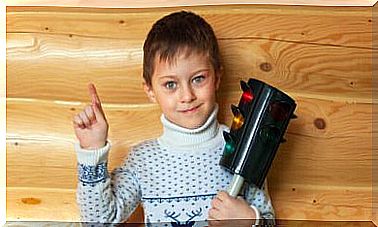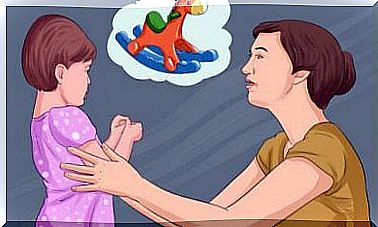Learning Problems In Children: Causes And Solutions

Learning disabilities in children encompass various neurobiological disorders that directly affect the way the brain receives, processes, stores, responds and produces any information. Children with a learning disability may have trouble writing, thinking, listening, speaking, reading, spelling, and even doing math.
Learning problems in children can also lead to attention deficits, which can occur along with problems with memory, coordination, social skills, and lack of emotional maturity. Despite their situation, children with learning difficulties are often very intelligent. What happens is that the information is processed in a different way by your brain, which creates a discrepancy between intelligence and performance in school.
Causes of learning disabilities in children
Several studies have managed to determine that among the causes of learning problems in children are genetic factors, for example, recessive chromosomes that generate specific problems in reading. Neurological dysfunctions are also considered significant causes of learning disabilities.
According to other research, there are also pre, peri and postnatal factors, or complications during pregnancy, while others determine that older mothers and fathers have a greater probability of having a dyslexic child. However, even if the child has this problem, there are therapies that can improve their learning.

Characteristics of a child with learning disabilities
Learning problems can be of the compulsion or overattention type, in which children tend to pay more attention to a single thing for a long time and neglect other stimuli that are also important for their development.
On the other hand, there are those of the impulsive distractibility or low attention type, in which children tend to focus their attention for a short time on one thing and then quickly move on to another.
These are some of the characteristics of a child with learning disabilities:
- Has difficulty understanding and following directions.
- You have trouble remembering what people are saying.
- Does not master basic reading, spelling, writing, and math skills.
- It is difficult for him to distinguish between the right and the left.
- You can confuse the order of the numbers.
- You have a lack of coordination when walking, playing sports, or simple activities like tying a shoelace.
- You can easily lose your school supplies.
- Presents confusion in relation to the times. For example, not finding the difference between “yesterday” and “today.”
- It can confuse some words.

Learning problem solutions
The inconveniences that the child may present when incorporating or expressing knowledge have to be evaluated by an expert who determines whether or not they present learning problems. A child psychiatrist can also help coordinate the evaluation and work with school professionals to conduct school tests.
Here are some solutions that can be very useful to face a learning disability:
- Children need to feel loved, understood and respected to make the learning process easier.
- They must have affection, affection and physical closeness. This helps them to be confident and to release doubts about their abilities.
- It is important that they learn through play and hands-on activities.
- They should be encouraged to play with others and establish friendships.
- They should be free to make mistakes and ask all their questions so that any issue is clear to them.
- Parents should treat them with fairness and consideration.
- They should set limits and rules for them, but when blamed for any reason, they should be treated with affection.
- It is important that they learn to face their emotions, frustrations, and fears.
- It is essential to expose them to difficult situations so that they overcome their fears.
- Parents must allow them to cry and release their feelings.
- They should always be trusted by their parents.
- When they do a good deed, it is very important to praise them, congratulate them and encourage them to continue progressing.
- When they fail, parents must teach them that defeat is a part of life and that they must persevere.
Building a child’s self-confidence is vital for healthy development. This will also help parents and other family members better understand the problem and cope with the realities of living with a child with a learning disability.










